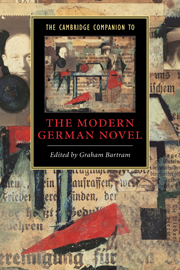Book contents
- Frontmatter
- 1 The German novel in the long twentieth century
- 2 Contexts of the novel
- 3 The novel in Wilhelmine Germany
- 4 Gender anxiety and the shaping of the self in some modernist writers
- 5 Franz Kafka
- 6 Modernism and the Bildungsroman
- 7 Apocalypse and utopia in the Austrian novel of the 1930s
- 8 Images of the city
- 9 Women writers in the ‘Golden’ Twenties
- 10 The First World War and its aftermath in the German novel
- 11 The German novel during the Third Reich
- 12 History, memory, fiction after the Second World War
- 13 Aesthetics and resistance
- 14 The kleiner Mann and modern times
- 15 The ‘critical’ novel in the GDR
- 16 Identity and authenticity in Swiss and Austrian novels of the postwar era
- 17 Subjectivity and women’s writing of the 1970s and early 1980s
- 18 The postmodern German novel
- Index
- Series List
13 - Aesthetics and resistance
Böll, Grass, Weiss
Published online by Cambridge University Press: 28 May 2006
- Frontmatter
- 1 The German novel in the long twentieth century
- 2 Contexts of the novel
- 3 The novel in Wilhelmine Germany
- 4 Gender anxiety and the shaping of the self in some modernist writers
- 5 Franz Kafka
- 6 Modernism and the Bildungsroman
- 7 Apocalypse and utopia in the Austrian novel of the 1930s
- 8 Images of the city
- 9 Women writers in the ‘Golden’ Twenties
- 10 The First World War and its aftermath in the German novel
- 11 The German novel during the Third Reich
- 12 History, memory, fiction after the Second World War
- 13 Aesthetics and resistance
- 14 The kleiner Mann and modern times
- 15 The ‘critical’ novel in the GDR
- 16 Identity and authenticity in Swiss and Austrian novels of the postwar era
- 17 Subjectivity and women’s writing of the 1970s and early 1980s
- 18 The postmodern German novel
- Index
- Series List
Summary
At the end of Peter Weiss's play Hölderlin, the eponymous poet is visited by the young Karl Marx. It is an entirely apocryphal encounter, but one which is revealing in terms of the relationship between writers and politics in the 1960s and 1970s. Marx describes how the encounter with Hölderlin's poetry has led to his realisation of the need for a materialist, dialectical political philosophy. He concludes that in furthering the aim of societal change the artist's individual vision is of equal status with political analysis.
Hölderlin appeared in 1971. Just a few years previously West Germany had experienced the most radical questioning of this position. The student movement had sought to enlist all aspects of social life in the cause of global revolution. In September 1968 the influential journal Kursbuch contained no fewer than three articles which proclaimed that literature was ‘dead’: in the current world-political situation, belles lettres had no discernible function; rather it was the duty of writers to document exploitation and oppression, whether of the South Vietnamese peasants or of the foreign workers in West Germany, and to engage themselves directly in combatting the concentration of the mass media in the hands of a few reactionary figures, such as Axel Springer. Peter Weiss himself had embraced this line.
- Type
- Chapter
- Information
- The Cambridge Companion to the Modern German Novel , pp. 187 - 201Publisher: Cambridge University PressPrint publication year: 2004

